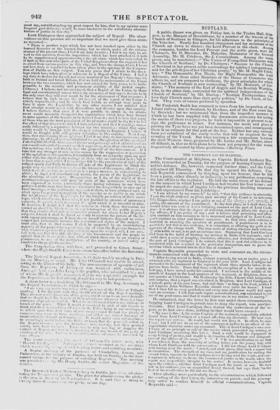SCOTLAND.
A public dinner was given on Friday last, in the Trades Hall, Glee. gow, to the Marquis of Breadalbane, by a number of the friends of the Church of Scotland in Glasgow, for his adherence to the principles of the Veto-law. Nearly five hundred clergymen and lay members of the Church sat down to dinner; the Lord Provost in the chair. Atnong the company, besides the Lord Provost and the noble guest, were De Chahuers, Sir D. Brewster, Dr. Makellar, Moderator of the General Assembly, Mr. M. Crichton, Sir J. Cunningham. Among the toasts given, may be mentioned—" The Union of Evangelical Dissenters wilh the Church of Scotland," by Dr. Chalmers; " Success to- the Church of Scotland in her present noble contendings for spiritual independence, and for the privileges of her Christian people," by Mr. M. Magill Crick- ton ; " The Honourable Fox Manic, the Right Honourable the Lord Advocate, and those other Members of the Home of Commons who adhere to, and are prepared to vindicate, the great principles for which the Church of Scotland is now contending," by Mr. Monteith, of C. stairs; " The memory of the Earl of Argyle and the Scottish Worthies, who, in the olden time, contended for the spiritual independence of the Church of Scotland," by Mr. Dunlop ; " Scottish Presbyterians who love their Church more than their party politics," by Dr. Cook, of Bel- fast. They were of course prefaced by speeches.
Sir Frederick Smith has returned to town from his inspection of the Inland railway line to Scotland, by Hexham, and of the East coast line, by Berwick; but we understand that, front the imperfect manner in which he has been supplied with the documents necessary for testing the merits of these two projects, he finds it impossible at present to as• sign the preference to either. For iustauce, the mode and place of passing the Tyne have not yet been determined upon, and consequently there is no estimate for that part of the line. Neither has any estimate been yet submitted of the costly works that will be required for the crossing of the Tweed. But what renders a fair comparison between the rivtil Western lines, projected by Mr. Locke and Mr. Miller, above all difficult, is, that no field-plans have been yet prepared for the routes respectively advocated by these gentlemen.—Roilevay Times.


























 Previous page
Previous page